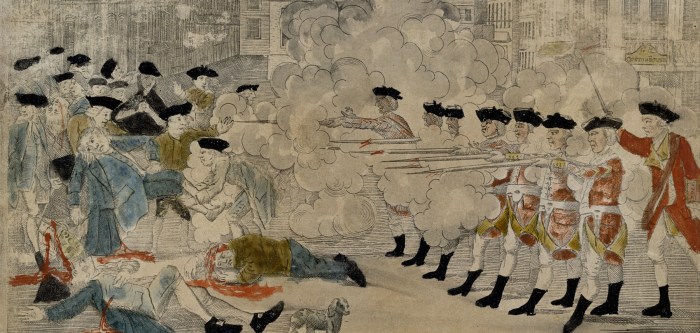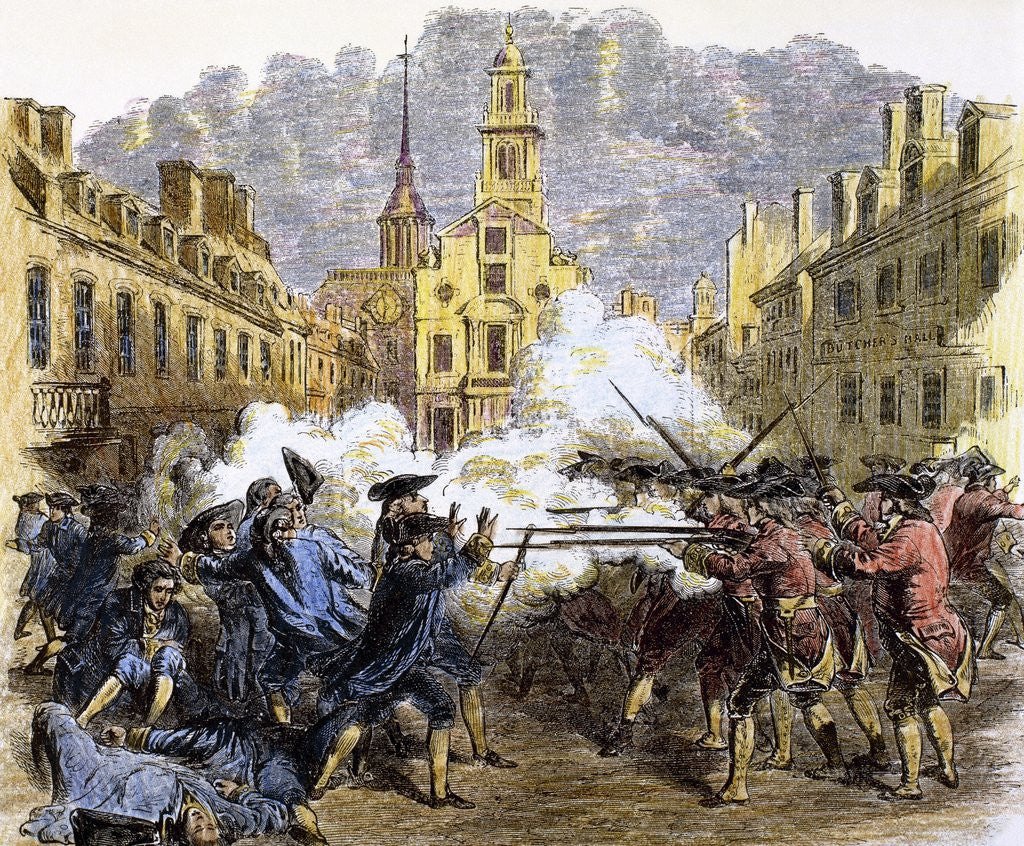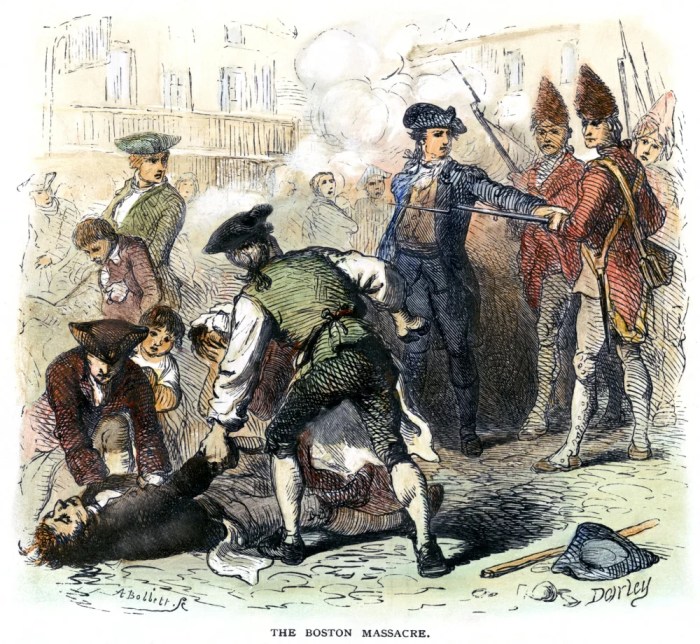The Boston Massacre, a chilling event that unfolded on March 5, 1770, stands as a pivotal moment in the burgeoning American Revolution. This tragic incident, where British soldiers fired upon a group of unarmed colonists, ignited a firestorm of anger and resentment, pushing the colonies further down the path towards independence.
The seeds of rebellion had been sown long before that fateful day, with growing tensions over taxation, representation, and the burgeoning sense of colonial identity.
The Boston Massacre, though a single event, served as a powerful symbol of the simmering conflict between the colonists and the British Crown. It became a rallying cry for the burgeoning revolutionary movement, solidifying the colonists’ resolve to fight for their freedom and self-governance.
The event’s reverberations echoed throughout the colonies, shaping public opinion and ultimately contributing to the outbreak of the American Revolution.
Historical Context of the Boston Massacre

The Boston Massacre, a pivotal event in the lead-up to the American Revolution, was not a random act of violence but rather a culmination of mounting tensions between British authorities and the colonists in Boston. The city was a hotbed of unrest, fueled by a complex interplay of political, social, and economic factors.
The Political and Social Climate in Boston
The relationship between the colonists and British authorities was strained, marked by a growing sense of resentment and distrust. The colonists felt increasingly alienated by British policies that they perceived as oppressive and unjust. The British government, on the other hand, viewed the colonists as rebellious subjects who needed to be brought under control.
This clash of perspectives created a volatile atmosphere in Boston, where political dissent was rampant.
The Boston Massacre, a tragic event that ignited the flames of revolution, was fueled by tensions simmering between the colonists and British troops. These tensions, which eventually led to the American Revolution, were also reflected in the Concord Petition , a document that highlighted the grievances of the colonists and their desire for self-governance.
The Boston Massacre, a stark reminder of the brutality of British rule, served as a rallying cry for the colonists, ultimately leading to the creation of a new nation.
The Relationship Between Colonists and British Authorities
The relationship between colonists and British authorities was characterized by a growing sense of alienation and mistrust. The colonists felt increasingly burdened by British policies that they perceived as oppressive and unjust, while the British government viewed the colonists as rebellious subjects who needed to be brought under control.
This clash of perspectives created a volatile atmosphere in Boston, where political dissent was rampant.
Economic Tensions and Grievances
Economic tensions further exacerbated the existing political and social divisions. The British government imposed a series of taxes on the colonists, including the Stamp Act, the Townshend Acts, and the Tea Act, which were widely seen as unjust and discriminatory.
The colonists argued that they should not be taxed without representation in Parliament, and they engaged in boycotts and protests to express their opposition to these policies. These economic grievances fueled a sense of anger and resentment among the colonists, making them more receptive to revolutionary ideas.
The Stamp Act and Other Acts That Led to Unrest, Boston massacre
The Stamp Act of 1765, which imposed a tax on all printed materials in the colonies, was a major catalyst for unrest. The colonists saw this act as an infringement on their rights and liberties, and they organized widespread protests and boycotts.
The Stamp Act Congress, a gathering of delegates from nine colonies, issued a Declaration of Rights and Grievances, outlining the colonists’ objections to British policies. The Stamp Act was eventually repealed, but the British government continued to impose taxes on the colonies, leading to further protests and unrest.
The Townshend Acts, which imposed taxes on goods like tea, glass, and paper, were met with similar resistance. The colonists organized boycotts and protests, and the British government responded with increased military presence in Boston. The Tea Act of 1773, which granted the British East India Company a monopoly on the tea trade in the colonies, sparked the Boston Tea Party, a pivotal event in the lead-up to the Revolution.
The Boston Massacre in American History

The Boston Massacre, a tragic event that occurred on March 5, 1770, holds immense significance in American history. It served as a pivotal moment in the escalating tensions between the British government and the American colonists, ultimately contributing to the outbreak of the American Revolution.
The Boston Massacre’s Significance as a Turning Point
The Boston Massacre was a turning point in colonial-British relations for several reasons. It dramatically heightened the colonists’ anxieties and suspicions towards British authority. The incident, in which British soldiers fired upon unarmed civilians, fueled the flames of anti-British sentiment, turning public opinion against the crown.
This event became a potent symbol of British tyranny and fueled the growing movement for independence.
The Boston Massacre’s Role in the Growing Tensions
The Boston Massacre was a culmination of several factors that were already contributing to the growing tensions between the colonists and the British. The colonists were frustrated by the British government’s imposition of taxes without their consent, such as the Stamp Act and the Townshend Acts.
The presence of British troops in Boston, seen as an oppressive force, further aggravated the situation. The Massacre served as a catalyst, igniting public outrage and strengthening the resolve of the colonists to resist British rule.
The Boston Massacre’s Legacy and Lasting Impact
The Boston Massacre left a lasting legacy on American identity and political discourse. The event became a powerful symbol of the struggle for liberty and freedom from oppression. It served as a rallying cry for the colonists, uniting them in their fight against British rule.
The Massacre also solidified the image of the British as tyrannical oppressors, further strengthening the colonists’ determination to achieve independence.
The Boston Massacre’s Role in Shaping American History
The Boston Massacre played a crucial role in shaping American history. It contributed to the growing movement for independence, culminating in the American Revolution. The event also served as a catalyst for the development of American political thought, as the colonists began to articulate their grievances against British rule.
The Massacre’s legacy continues to resonate today, reminding us of the importance of freedom, justice, and the need for vigilance against oppression.
Related Terms and Concepts

The Boston Massacre, a pivotal event in the lead-up to the American Revolution, is closely intertwined with various terms and concepts that shed light on its significance and context. Understanding these terms helps to grasp the complexities of the event and its impact on the course of American history.
Crispus Attucks
Crispus Attucks, the first person killed in the Boston Massacre, is a pivotal figure in the event’s narrative. He was a free Black man of mixed African and Native American descent, who had a history of resisting oppression. Attucks’ presence in the crowd that night symbolizes the diverse nature of colonial resistance and the shared struggle against British rule.
His death became a rallying cry for the colonists, highlighting the brutality of British troops and fueling the growing movement for independence.
The Sons of Liberty
The Sons of Liberty, a radical political organization formed in the 1760s, played a crucial role in escalating tensions between the colonists and the British government. Their involvement in the events leading up to the massacre, such as the Boston Tea Party, helped to create an atmosphere of defiance and unrest.
They actively organized protests, spread propaganda, and encouraged resistance against British policies. Their presence at the scene of the massacre, while not directly involved in the confrontation, underscores their influence in shaping the colonial response to British rule.
Comparison with the Boston Tea Party
The Boston Massacre and the Boston Tea Party, both key events in the colonial era, share a common thread: the growing frustration of colonists with British policies. While the Boston Tea Party was a symbolic act of defiance, involving the destruction of British tea, the Boston Massacre was a violent confrontation that resulted in the deaths of five colonists.
Both events, however, played a significant role in galvanizing colonial resistance and fostering a sense of unity against British rule.
Significance of the Term “Massacre”
The term “massacre” carries significant implications in the context of the Boston Massacre. It highlights the brutality and injustice of the event, emphasizing the disproportionate use of force by British soldiers against unarmed colonists. The use of this term was a deliberate tactic by the colonists to garner public sympathy and rally support for their cause.
It also served as a powerful tool for propaganda, effectively shaping public opinion and fueling the flames of revolution.
Final Review: Boston Massacre
The Boston Massacre, though a tragic event, served as a catalyst for the American Revolution. It galvanized colonial unity, fueled the flames of dissent, and solidified the resolve for independence. The legacy of the Boston Massacre continues to resonate today, reminding us of the importance of peaceful dialogue, the dangers of unchecked power, and the enduring struggle for liberty and self-determination.